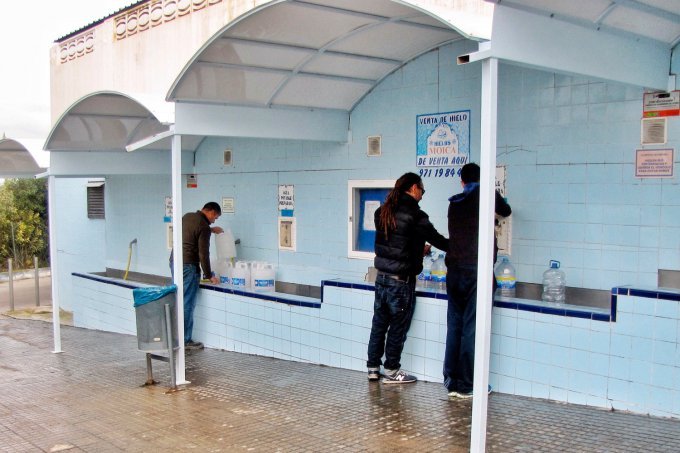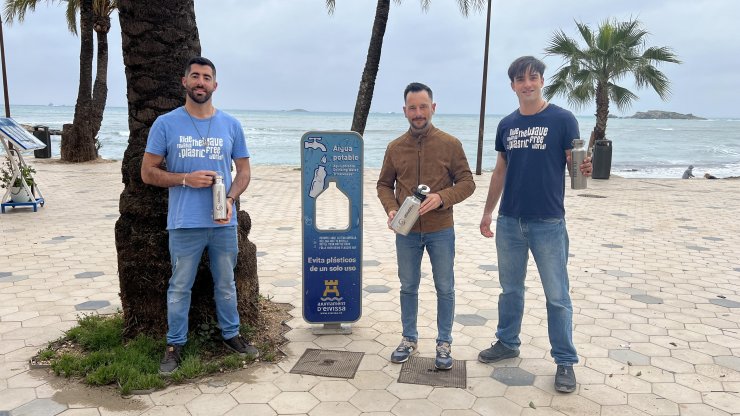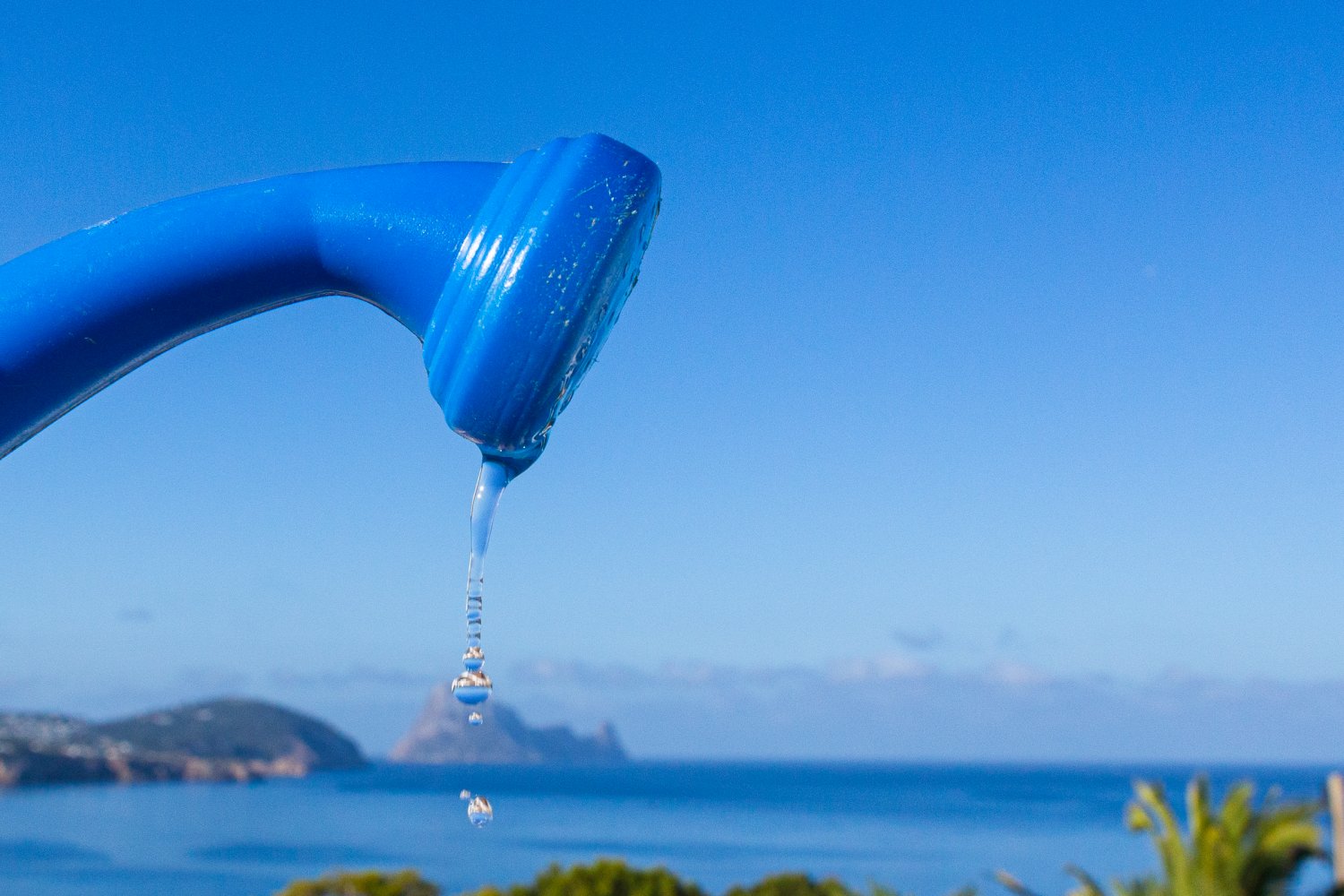Water quality of Ibiza's tap water
Many visitors and residents want to know, ‘Is the tap water in Ibiza safe to drink?' The answer is Yes. That is because it has been treated and purified. However, though it is 'safe' to drink, it frequently does not taste good owing to its extremely high levels of salt or calcium.
Too much salt can cause heart problems and too much calcium can cause kidney problems. It is very unlikely this will be a problem if you're visiting on holiday, but it's not ideal if you live here and use it long term. Buying a filtration system for your home is a good idea if you spend a lot of time on Ibiza each year.
There is no need to worry about the water that you consume in hotels and restaurants. If their own water supply is not up to scratch because of its salt content, then any water or ice you consume there will have been purchased.
Most people end up buying bottled water. At the bottom of this page, we include some handy tips that will help you to save money and cut down on single-use plastic.
Ibiza's climate
Ibiza's climate is typically Mediterranean, with an average of 450mm of rain per year. This is around 50% of the average annual rainfall in northern Europe.
Ibiza's water supply
Traditionally, Ibiza was reliant on a couple of dozen aquifers, natural underground reservoirs, for its entire water supply. That may once have been enough to cater to the island's residents, but it is far from sufficient to cope with the millions of visitors who come here, almost all of them in the summer months. In Ibiza, water consumption per person stands at around 200 litres per day, double that of Barcelona.
Over time, the aquifers have become overused and depleted and, what's more, more than half of them are now contaminated with seawater. As is customary in summer, reserves of fresh water on the island decrease, meaning there is a need for greater awareness regarding water use among both residents and visitors.
Given the ongoing difficult conditions, the island authorities have decided to shut off the showers on Ibiza's beaches, to save water and as a measure designed to increase public awareness of personal consumption.
This situation is compounded by another important factor, inadequate infrastructure. The island has three desalination plants, one in each of the large towns. To further enhance water security and reduce reliance on overexploited aquifers, the Balearic government has initiated studies for the construction of a fourth desalination plant in the San José area. However, desalination plants, though important, are not enough on their own.
There are 11 water treatment plants in Ibiza. Unfortunately, they are also subject to contamination by seawater. Seventy per cent of the wastewater that reaches water treatment plants in the Balearic Islands ends up in the sea. In Ibiza, owing to salination, that figure is 99%! Ultimately, this leads to further contamination of the sea and the island's aquifers.
To address the situation, the Balearics Waste Law came into effect in 2022. Every hotel had to install water-saving devices in bathrooms, ban single-use amenities and change oil boilers for gas or electric ones in order to emit less CO². The law also promotes making use of rainwater – a factor which will be considered when classifying establishments. Furthermore, tourist establishments must measure their water consumption.
The water problem in Ibiza is serious and it's not really one you want to have to think about when you're on holiday. But if everyone is conscious of the situation and careful about their own consumption of water then it will go a long way to preserving the island's vital water supply.
Ways to save water
Whether you're a visitor or a resident, here are some easy ways to reduce your water consumption:
In the bathroom
- Turn the tap off while washing your hands, brushing your teeth or shaving.
- Showers use much less water than baths. And remember the five-minute rule!
- Reduce the water pressure on your shower and, if possible, turn it off while you are lathering yourself or shampooing your hair.
- If you're staying in a hotel, hang your towels up to dry after you've used them; like this they won't be taken away to be washed on a daily basis.
In the kitchen
- Wash dishes and clean vegetables in a full sink rather than under running water.
- Run the dishwasher on full loads. New models generally use less water than it takes to wash dishes by hand.
- Avoid using running water to thaw food: defrost it in the refrigerator.
- Cook food in as little water as possible; it also means the food retains more nutrients.
- Try to match the water level on your washing machine to the size of the load and wash dark clothes in cold water as it saves water and energy and means the clothes retain their colour.
In the garden
Recycle water wherever possible e.g., wash your fruit and veg in a bowl and then re-use the water on plants.
- If you have a garden, try to plant native varieties of trees and shrubs as they use less water than more “fashionable” tropical types.
- Water plants early in the morning or late in the evening to reduce evaporation. Deep-soak plants when watering to allow the moisture to penetrate to the roots, where it will be most beneficial. Light sprinkling evaporates quickly and encourages shallow root systems.
- If you have a villa with a swimming pool, cover it when it's not in use. You can lose up to 55 litres a day through evaporation when it's hot.
- Take your car to a commercial car wash that recycles water – they use less water than if you wash it yourself.
If you want to know more about how to reduce your water use on Ibiza, please check out this page of the local environmental organisation Ibiza Preservation.
Save money and cut down on single-use plastic bottles
Water filling stations
There are several filling stations on Ibiza, where you can fill up your own water containers with treated drinkable water from the aquifers (20 litres of water costs approximately €1).
You can find these filling stations for example behind the petrol station in San Rafael (Fuentejara, Google Maps Ref.), on the main road from Ibiza Town to Santa Eulalia (Pozo Can Guasch, Google Map Ref.) and in San José (Google Map Ref.).

Fuentejara water filling station behind the petrol station of San Rafael
Public water fountains
Another great way to cut down on single-use plastic bottles is to make use of one of the four recently installed public water fountains in Ibiza Town. The fountains provide free filtered potable water, meaning you will be able to refill your water bottles and thus cut down on plastic waste.
The Council has installed three fountains so far: in the square Plaza Sa Graduada in the Carrer de Madrid in the town centre, on Plaza Julià Verdera beside the beach in Figueretas and in the small park Parque de la Paz on Avenida Isidor Macabich. There is another one planned on the boulevard Paseo Juan Carlos I, which runs along the marina,
You can find their exact locations as well as those of restaurants offering free filtered water on the Cleanwave app.

Public water fountain on the promenade of Figueretas
Armed with this information, you can now enjoy your holiday in Ibiza knowing that you are doing your bit to save water, cut down on plastic and preserve the island's ecology.
